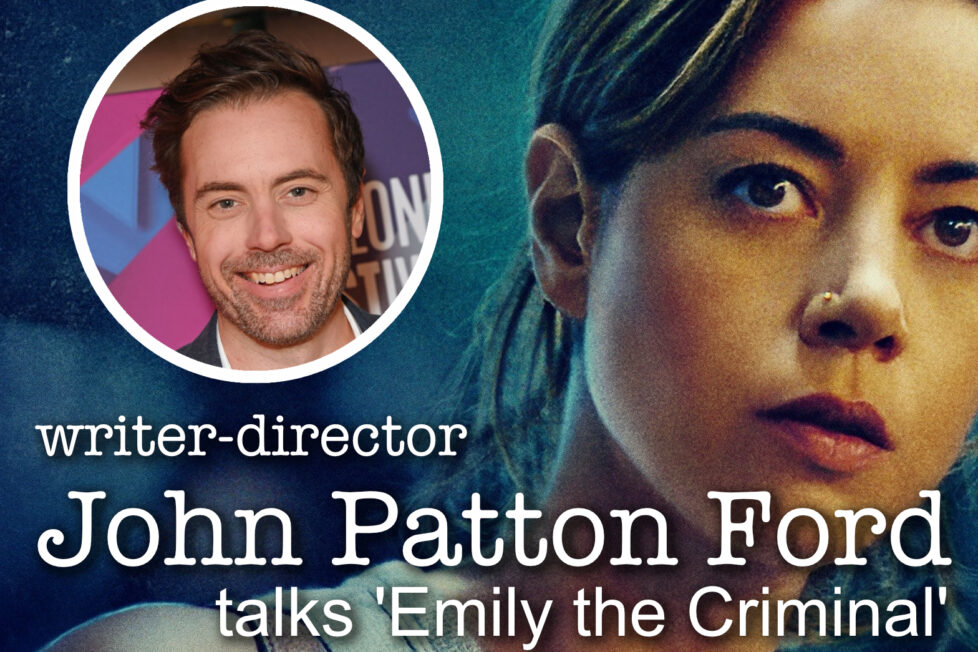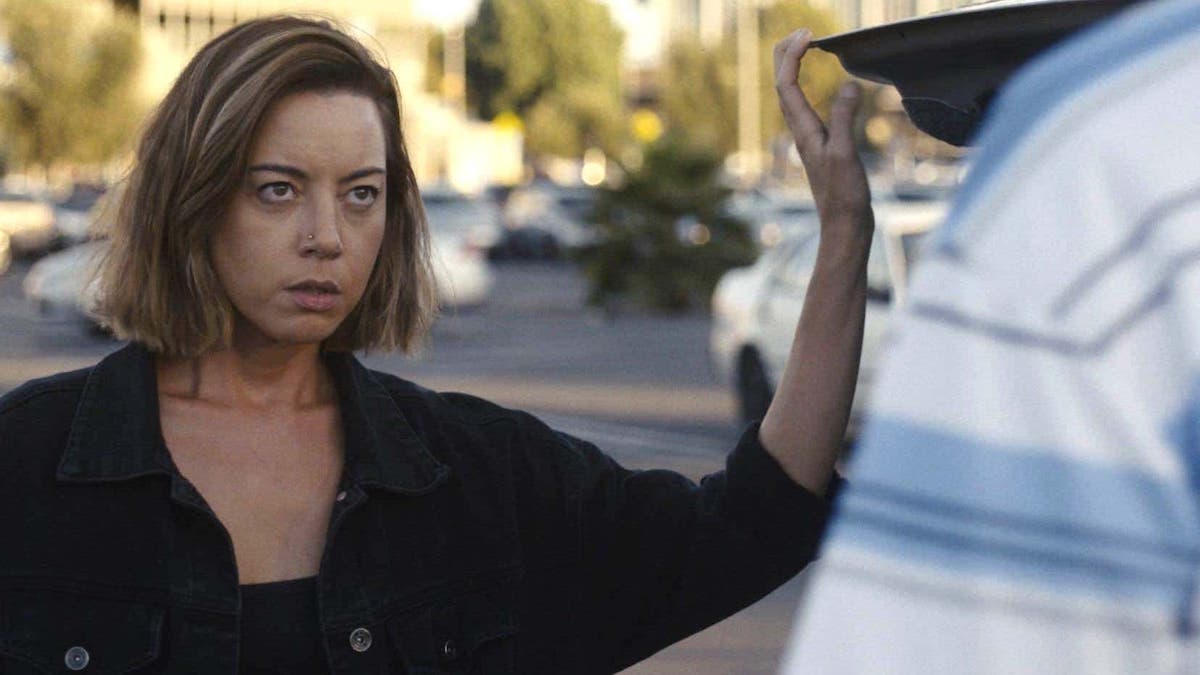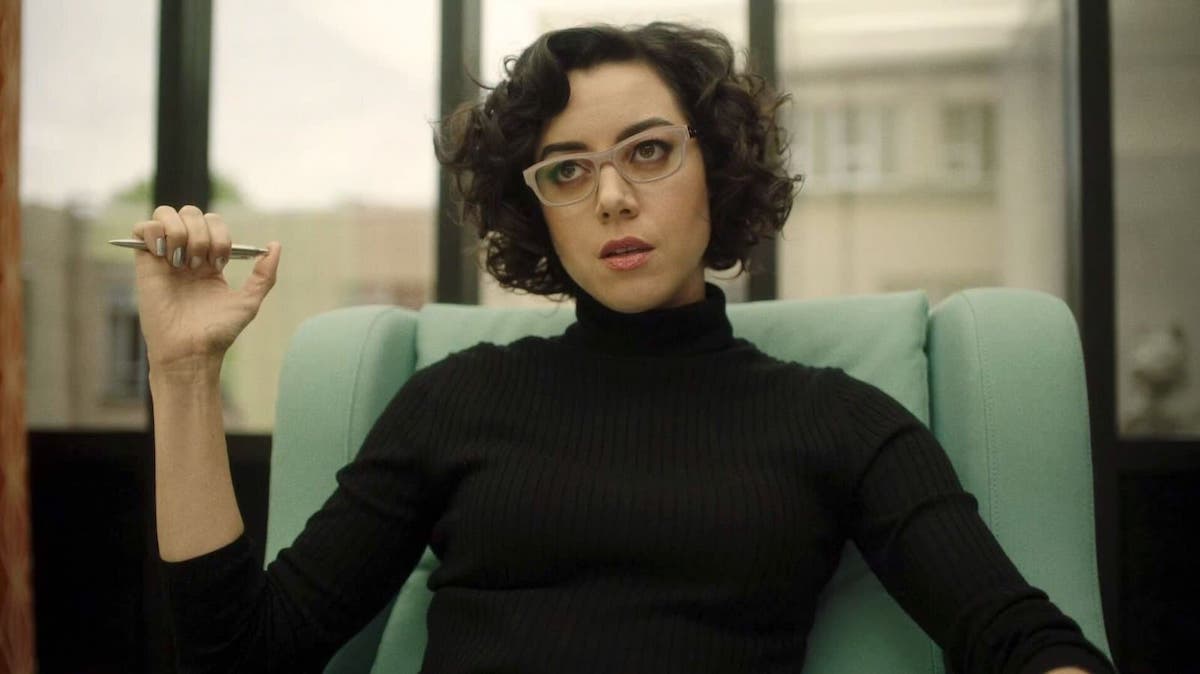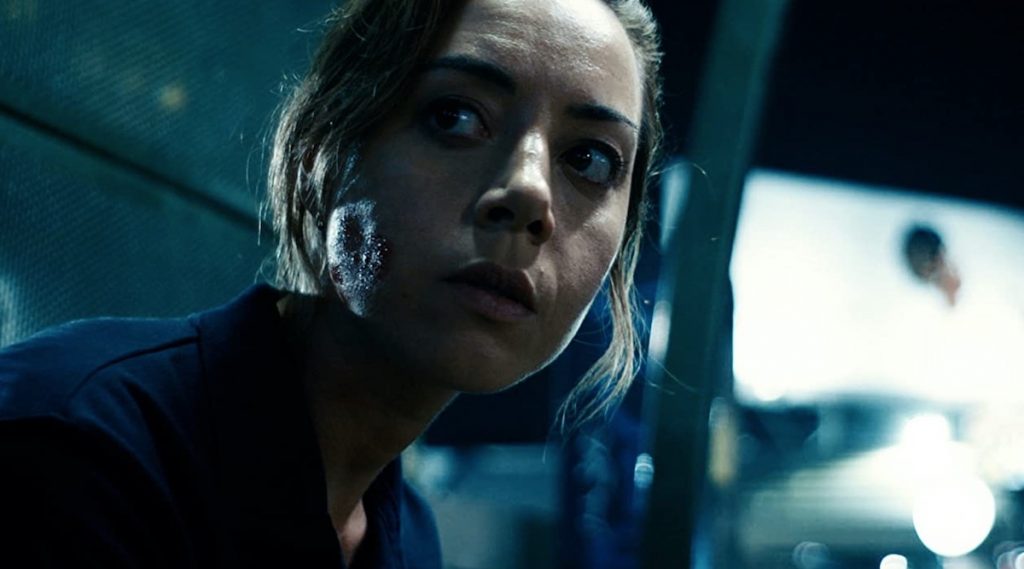An Interview with ‘Emily the Criminal’ director John Patton Ford


JONO SIMPSON: Hello, I’m Jonathan Simpson from the online publication Frame Rated here in the UK, and I’m joined today by the writer and director of Emily the Criminal, John Patton Ford.
You can watch the entire Zoom call interview in the video embedded below, or read the transcript underneath.
JONO: First of all, let me thank you for taking the time during your busy schedule to talk to me today, and let me kick things off by congratulating you on the release of Emily the Criminal.
JOHN PATTON FORD: Thank you, man. I appreciate that a lot.
JONO: For the uninitiated, please could you tell our readers what it’s about.
JOHN: Sure, the movie is about a young woman who becomes a criminal to pay off her student debt. That’s what it’s about in a nutshell. There’s a lot more to it than that. It’s really about someone discovering what they’re good at and what they like to do, and what they’ll continue doing. In a weird way, it’s a coming-of-age movie dressed up as a thriller, and it stars Aubrey Plaza.
JONO: Since its premiere at last year’s Sundance, how has the reaction been? How do you feel now that your labour of love is finally out in the world?
JOHN: I feel pretty well. It’s been an interesting time. I mean, we premiered at Sundance over a year ago and we were fortunate because we got pretty positive critical reviews at Sundance. You never know how that’s going to go. Up to that point I had only seen the movie with my editor. We’d only watched it on a computer and never with a big crowd. You have very little objectivity and you don’t know what you have. To have the movie play and for all these publications to write about it in a positive way, was a relief more than anything. That’s the feeling [laughs], just relief that you haven’t made a stink bomb.

Then the reception throughout the rest of the year has been kind of fascinating to watch how it plays in certain countries and how it’s received in certain places. Certain demographics received it really positively and other demographics received it positively but in totally different ways. Everyone responds in different ways to the movie and it’s been kind of an education. Overall, it’s been great and we’re incredibly fortunate to have made the thing we did.
JONO: I understand you’ve been asked repeatedly where the idea came from, but what inspired you to actually put pen to paper and write the screenplay?
JOHN: Good old personal experience, you know? I was in a lot of student debt. I’m not sure how the system works in the UK but in the US it costs a lot of money to go to college generally. I was in a ton of debt at a pretty young age and I felt a lot of anxiety and a lot of resentment. A lot of feelings, every feeling. So I wanted to write something that kinda honoured the desperation that young people can feel at that age. And I wanted to do it with a genre movie and not with some sort of kitchen sink drama that would feel like homework. I wanted it to feel like a ride and for it to be fun on some level. That’s how it really started.
JONO: As your first feature-length, what challenges did you face getting the film made?
JOHN: Oh God! Nothing but challenges [laughs]. Nothing was ever easy. The hardest thing when you’re a first-time director, you’re a first-time director. That’s how people label you and that’s how they talk about you. So, it sounds an awful lot like you don’t know what you’re doing, you’re unqualified, and you’re a complete gamble. Which you are. Even having the script and even having a little credentials under your name, and even having Aubrey Plaza on board wasn’t quite enough.
We had to really, really struggle to put the money together to do it. It took a long time. I think I got Aubrey in the summer of 2018 and we didn’t close the financing until 2020. So, it took us two years to get the money. Even then, once we got it we had to wait a whole year to shoot the film because of COVID. You can imagine what it’s like. I was working for a decade to get my first movie made and I finally got the financing and everything together then a global pandemic hit. It kinda felt like someone up there was like “let’s make it a little harder for this guy”. There were challenges all the way but in a strange way, I wouldn’t have it any other way. It all kind of worked out in a peculiar turn of events.
JONO: I’d love to pay tribute to Aubrey Plaza, who both stars and produces your film. How did you both meet? How did the script fall into her hands? Was she on board straight away?
JOHN: Yeah, that’s a great question. I wrote the script and then gave it to a friend of mine, just for notes. Like, “hey can you read this and tell me what you think?” My friend read it and he dug it and said “I think Aubrey Plaza might be into this.” He said, “I know her and I’ve worked with her before. I have an ongoing relationship with her, let me send it to her”. And he did! Aubrey received the script from someone she knows, who she trusts, and whose taste she trusts. It wasn’t just a random thing.

For that reason, she read it swiftly and then reached out to me in the Summer of 2018. I remember I left my apartment and walked to a coffee shop to meet Aubrey Plaza and it felt very strange. I met her there and we started talking and I knew she was the right person immediately. And then we were just off to the races. It felt like we were making it together. It felt much like, she wasn’t just the actor, she was the producer and this was both of ours. We were equally driven and we were a team from that point on.
JONO: Did having her name attached to it help move the production process quicker?
JOHN: Yeah! I mean, I can’t say it moved quickly because it took a very long time even with her attached to it. But yes, her name was the one thing that made it seem real to people. That made it seem achievable, It also gave the movie some kind of value and qualification. People could look at it and go “okay, that makes actually makes money. That might be something people actually watch.”
JONO: Aubrey is known for her dry and sardonic characters and I think you got things out of her as an actor that not many people have seen before. What do you think you were able to tap into in regard to her talents that not many directors haven’t?
JOHN: Wow! Thanks. I can only credit myself so much. She’s really it. She took a huge risk and tried something different and she brought things to the table that she usually doesn’t. [laughs] I can’t totally take sole credit for what she gave, but I can tell you that when I first met her. Then in the first year, two years, we would hang out and I got to know her a little bit. I got to know her background a bit, I got to know some details about her life, and she’s complicated. She’s an interesting, complicated human being. She is radically unsafe and I mean that in the most loving way.
But man, you don’t know where it’s going to go with her, you really don’t. She upends every situation and she surprises people, she’s a disrupter. I wanted to make something that wasn’t just a joke and that wasn’t using her sardonic flavour. I wanted to see the full spectrum and unpack why this person is like this. It’s funny that now we’ve made the movie I feel that we could have gone way further. Now that I know her as well as I do, there’s so much more there that people don’t even know. She’s incredible. She’s stupidly talented.
JONO: One thing I loved was that the audience experience the film from Emily’s perspective. it mainly consists of tight compositions and handheld camerawork, please could you explain the visual style? Was this intentional when you were writing the script or was it something that manifested during the tight production schedule?
JOHN: That’s a great question. I thought a lot about that style whilst writing it and it was certainly written for a certain kind of style. I hate to put a label on it but people could call it vérité. I was thinking about that but then as we got into production the whole thing got augmented by a handful of necessities. Number one was COVID, it was COVID days. The minute we would shoot a wide shot you could tell it was COVID. You could see people in the background wearing masks. Everything was a little weird.
We ended up having the camera pretty close to the characters because if we didn’t it looked weird. We learned that if we backed up, it looked like a movie about a sociopath not wearing a mask in public [laughs]. So, we didn’t have much choice. It kinda lent this weird anxiety to the movie that sort of worked out. There are certainly moments watching it that I wish we were able to back up and shoot wider, but it kinda worked out.
JONO: It reminded me very much of the crime-thrillers of the 1970s and ’80s. Was there anything from that era that heavily influenced you?
JOHN: Yeah, completely. Those are some of my favourite movies and some of Aubrey’s favourite movies, and also Jeff Bierman whose the cinematographer that shot the movie. We all talked a lot about certain references. A movie called Straight Time (1979) with Dustin Hoffman, which was only in theatres for a week, and then it was pulled from theatres. It’s something that’s only now starting to be fully appreciated.

Then there are the big classics like Taxi Driver (1976) and all those things. We also talked a lot about the Dardenne Brothers who are some Belgium filmmakers that I love. Those guys were making documentaries in the 70s. Then they started making narrative feature movies during the 80s and 90s, and never altered their style. They shot their features like they shot their documentaries. Things like tracking behind characters on 15mm lenses. All these odd-ball things they did we definitely installed. It was a combination of influences.
JONO: That segues nicely to something that came out recently. It was revealed Paul Schrader got Emily the Criminal confused with Emily in Paris and thought it was a spin-off. How was your reaction when you first heard the news?
JOHN: Yeah, I heard about that. I thought it was a great idea. I would love to see the spin-off. Let’s do it. She goes to Paris and starts robbing people [laughs]. I was just happy Paul Schrader has seen my movie, that was incredible.
JONO: It must have been an honour to have a writer of Taxi Driver recognise your work.
JOHN: It was an honour. He’s an absolute legend and he’s written some of favourite movies. That’s not a false platitude, that’s true. My favourite movie is probably Raging Bull (1980) which he wrote. I’ll take it, man.
JONO: Despite the dangers and the knock-backs of the patriarchal system that Emily encounters, she still has the strength and courage to continue her hustle. In the director’s notes, it said the story was inspired by your own anxieties and fears of student debt: what would your advice be to people perhaps considering a career in film who feel defeated by the system?
JOHN: Hm. Well, man, it is complicated. I would say, number one, if possible, don’t put yourself in debt [laughs]. To get into filmmaking you have to put yourself in a position where you have low overhead and where you can work unpaid for a period of time. You have to live cheaply and put your money into making short films or maybe just giving yourself the time to write a script. You can’t put yourself in a position where you have to work full-time and then you’re trying to write a script at night or something. It’s not going to work out.
I would advise don’t make it even harder on yourself by putting yourself in debt. But also, this is complicated and sounds like total BS but you have to work for the love of the process of working. Not for the end result that you may think you might acquire. It’s a really difficult thing to accept but you can’t work because I want to make a movie and then I’ll be happy. You can’t live like that. You have to live like “I’m just happy spending two hours this morning writing a script” and whether or not it ever happens isn’t the most relevant thing. What makes me happy is the process of working on it. That’s a much better way of living your life. That would be my biggest piece of advice. It’s easy for me to say because I have made a movie, but it doesn’t make it any less true.
JONO: Do you have any other projects lined up at the moment?
JOHN: I got stuff that I’m working on. There’s a movie I hope to make this year that’s a lot bigger and more elaborate. Then there’s a handful of other things that are orbiting. There’s a lot going on and I’m just trying to keep my head down and work. So we’ll see.
JONO: Thanks again for taking the time to speak with me today.
JOHN: No worries. This was fun.
